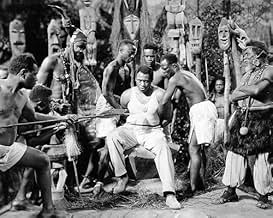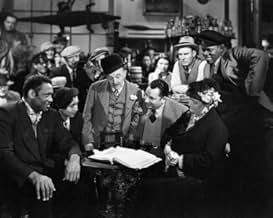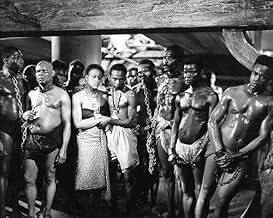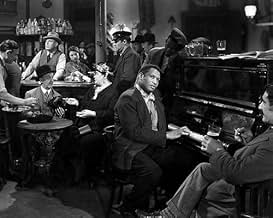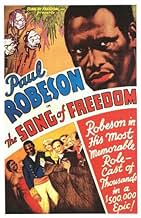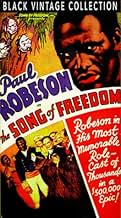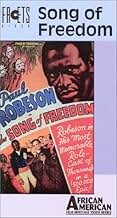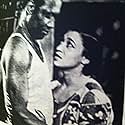Agrega una trama en tu idiomaA black British dockworker named Johnny Zinga becomes a famous singer and learns that he is the rightful king of the African island of Casanga.A black British dockworker named Johnny Zinga becomes a famous singer and learns that he is the rightful king of the African island of Casanga.A black British dockworker named Johnny Zinga becomes a famous singer and learns that he is the rightful king of the African island of Casanga.
- Dirección
- Guionistas
- Elenco
Elisabeth Welch
- Ruth Zinga
- (as Elizabeth Welch)
Bernard Ansell
- Sir James Pyrie
- (as Bernerd Ansell)
Cornelia Smith
- Queen Zinga
- (as Miss C. Smith)
Sydney Benson
- Gate-Keeper
- (sin créditos)
Cathleen Cavanagh
- Woman
- (sin créditos)
Alf Goddard
- Alf, the Bartender
- (sin créditos)
Opiniones destacadas
Although no-one could call this a great movie, it is of compelling historical interest. At a time when Black people in the movies were servants or scoundrels, Paul Robeson portrayed a London dock-worker who is discovered by an impresario and launches a great singing career; after that, he goes to Africa to bring education and enlightenment to the tribespeople.
It's easy to be harsh on this movie; it shows the people of Africa as benighted savages in need of guidance (only this time they get it from Robeson, playing an Afro-cockney). The whole second half plays in tropical-adventure mode, with all the clichés of the 1930s.
But you have to realize that the film's sympathies are with the London dock-workers, black and white; it goes to great lengths to show them treating each other with friendship and respect, and this is the most notable part of the story. Everyone else is a caricature - the impresario, the aristocratic explorer, the witch-doctor, and so on.
Anyone who has a tolerance for 1930s films will quickly realize that this is much better than most of them, and is worth a look for many reasons, not the least is the opportunity to hear Robeson's great singing voice. One curious fact is that this is from Hammer Studios, which later became identified with horror films.
A must see for anyone interested in cinema.
It's easy to be harsh on this movie; it shows the people of Africa as benighted savages in need of guidance (only this time they get it from Robeson, playing an Afro-cockney). The whole second half plays in tropical-adventure mode, with all the clichés of the 1930s.
But you have to realize that the film's sympathies are with the London dock-workers, black and white; it goes to great lengths to show them treating each other with friendship and respect, and this is the most notable part of the story. Everyone else is a caricature - the impresario, the aristocratic explorer, the witch-doctor, and so on.
Anyone who has a tolerance for 1930s films will quickly realize that this is much better than most of them, and is worth a look for many reasons, not the least is the opportunity to hear Robeson's great singing voice. One curious fact is that this is from Hammer Studios, which later became identified with horror films.
A must see for anyone interested in cinema.
If you can possibly see The Song Of Freedom by all means do so. It's a chance to see Paul Robeson sing and give a fine acting performance in a story set partially in Africa. It's a mini-version of the famous American mini-series Roots. Paul in fact carries his roots with him both in a song that's been with him since birth and a medallion handed down to him from an ancestor who was sold into slavery and who was king of his people. That's all dealt with in a short prologue.
Fast forward to 1936 and Robeson is working on the London docks and also provides a bit of entertainment for his fellow stevedores. Impresario Esme Percy discovers him and turns Robeson into a concert/opera singer. But one night a backstage visitor tells Robeson that this melody which he has engraved in his soul is the chief's song from a particular tribe in Africa. Robeson and wife Elisabeth Welch go to that part of Africa where he attempts to reassert his royal prerogatives.
As a colonizing power in Africa, the British picked up knowledge about the place that Americans only gleaned from Edgar Rice Burroughs and other such pulp fiction authors. And in these years prior to World War II did film a lot of stories on location there such as The Four Feathers in the Sudan. Song Of Freedom was shot on location in Sierra Leone for the African part of the story. It's light years more real than anything you would get from Hollywood.
Incidentally the gambit of the 'lost song' may very well have been lifted from the Victor Herbert operetta Naughty Marietta. No matter, it's well done and provides Robeson with a number.
Elisabeth Welch who was a fine singer in her own right gets to do Sleepy Rivers. I wish she had been given more to do.
Seeing both Paul Robeson and a glimpse of the real Africa is a chance no one should pass up.
Fast forward to 1936 and Robeson is working on the London docks and also provides a bit of entertainment for his fellow stevedores. Impresario Esme Percy discovers him and turns Robeson into a concert/opera singer. But one night a backstage visitor tells Robeson that this melody which he has engraved in his soul is the chief's song from a particular tribe in Africa. Robeson and wife Elisabeth Welch go to that part of Africa where he attempts to reassert his royal prerogatives.
As a colonizing power in Africa, the British picked up knowledge about the place that Americans only gleaned from Edgar Rice Burroughs and other such pulp fiction authors. And in these years prior to World War II did film a lot of stories on location there such as The Four Feathers in the Sudan. Song Of Freedom was shot on location in Sierra Leone for the African part of the story. It's light years more real than anything you would get from Hollywood.
Incidentally the gambit of the 'lost song' may very well have been lifted from the Victor Herbert operetta Naughty Marietta. No matter, it's well done and provides Robeson with a number.
Elisabeth Welch who was a fine singer in her own right gets to do Sleepy Rivers. I wish she had been given more to do.
Seeing both Paul Robeson and a glimpse of the real Africa is a chance no one should pass up.
Sure, the movie is dated in both technique and appearance. But it does have the great Paul Robeson in the central role as a dockworker and social equal of his white work mates. This is at a time when Blacks in American movies were reduced to either menials or buffoons. In terms of stereotypes, Robeson's non-demeaning role takes some getting used to. But try imagining that powerful presence and commanding voice in anything other than a dignified role. No wonder he was widely viewed as a threat to Jim Crow stereotypes.
Perhaps the film's most interesting aspect is what the Westernized Robeson can do for his benighted tribe of ancestors once he returns to them, uninvited. Sure, he can bring those sanitation and medical advances that will improve their collective health. The movie does a pretty good job of dramatizing that aspect, and we're all rooting for him to win out over the tribe's non-scientific methods and the witch- doctor power structure keeping them in place. But what happens after that. Of course, the movie stops at that point, so we don't know. But we do know another area of the continent has been opened to Western presence. The question then is whether Robeson will also bring in Western commercial interests, of much more dubious benefit than the proved health benefits, as history shows. After all, penicillin is one thing, Chevron is another. This remains a point to ponder now that the movie has set up the initial stage.
Despite its shortcomings (the outrageously fey Donizetti, for one), the movie remains an interesting artifact of its time, especially for Robeson's and other Blacks' acceptance into the white working class of London's docks. I'm sure the leftist Robeson found that labor- solidarity aspect particularly appealing. Then too, Elisabeth Welch delivers a fine natural performance as Robeson's loyal wife. We root for the two of them just as we would root for a courageous white couple. Above all, however, the film remains a chance to view one of America's noblest forgotten figuresthe great Paul Robeson.
Perhaps the film's most interesting aspect is what the Westernized Robeson can do for his benighted tribe of ancestors once he returns to them, uninvited. Sure, he can bring those sanitation and medical advances that will improve their collective health. The movie does a pretty good job of dramatizing that aspect, and we're all rooting for him to win out over the tribe's non-scientific methods and the witch- doctor power structure keeping them in place. But what happens after that. Of course, the movie stops at that point, so we don't know. But we do know another area of the continent has been opened to Western presence. The question then is whether Robeson will also bring in Western commercial interests, of much more dubious benefit than the proved health benefits, as history shows. After all, penicillin is one thing, Chevron is another. This remains a point to ponder now that the movie has set up the initial stage.
Despite its shortcomings (the outrageously fey Donizetti, for one), the movie remains an interesting artifact of its time, especially for Robeson's and other Blacks' acceptance into the white working class of London's docks. I'm sure the leftist Robeson found that labor- solidarity aspect particularly appealing. Then too, Elisabeth Welch delivers a fine natural performance as Robeson's loyal wife. We root for the two of them just as we would root for a courageous white couple. Above all, however, the film remains a chance to view one of America's noblest forgotten figuresthe great Paul Robeson.
This was a fairly good film dating back to 1936 from Hammer Productions in Britain. Starring Paul Robeson, whose extraordinary vocal talents are properly utilized. It's the story of a African-Briton living in England after slavery has been abolished in the European nation. He works on the docks and his one dream in life to discover his ancestry in Africa. His interest is fueled by a song that he sings often, be it to his wife or during his job on the docks. A song that he never learned, but as he would put it, was always inside of him. His amazing bass singing voice is over-heard by a theater yuppie and he is quickly recruited to the stage appearing in theatrical productions while utilizing his singing talents. After creating a fan following and with the help of some knowledge from a theater-goer, he decides to finally take the trip to Africa to find his "roots." Overall, the film is good, if not a bit too idealistic. But it doesn't harm the film's integrity and Robeson's great talent as both an actor and singer. Seeing how this film is not known well, I would recommend it. It's not a very long picture; it runs just under and hour and twenty minutes. So take some the time, and find this movie. If not for the film, then do it for Robeson's incredible vocal talents.***
This film made Paul Robeson proud, and it also garnered high approval from leading black intellectuals at the time, such as Langston Hughes. In its first half it's very easy to see why. The story is far-fetched, but it shows black people as regular folks amongst the working-class of London, without stereotypes, and the desire on the part of one of them (Robeson) to find out where his ancestors were from. In flashing through a couple of centuries, it also showed a sample of some of the horrors of slavery, and we see a clear link to how that caused Robeson's character to be tragically disconnected from his past.
Hearing Robeson perform six songs was quite a treat, and 5-stars on its own. The second, "Sleepy River," which we see with a montage of people listening to his wonderful voice at night, is particularly stirring. Meanwhile, Elisabeth Welch is such a cutey pie as his wife, and more importantly, she's also a real person and not some mammy/servant stereotype. We even get to hear her reprise the song "Sleepy River" at the end, which was wonderful.
The film falters a bit in its second half when Robeson's character makes his way back to his ancestral island, and discovers it run by superstitious, backward people. The characterization felt troublesome, particularly since Robeson seeks to improve their life with the advances he's learned growing up in a European culture, one the film shows to be superior in every respect. On the other hand, at least it's a black man who has come to do this, and a strong, talented, intelligent black man at that. There is something moving at the heart of wanting to find your ancestral land, and to help the people living there.
I might have knocked my rating down a bit because of the problematic bits, or because the interaction Robeson has with the Africans seemed so implausible, but I kept in mind the film was made in 1936. The contrast of Robeson and Welch's characters to what was being spewed out in Hollywood at the time for African-Americans is striking, and undeniable. I enjoyed watching them here, and for the film's musical numbers and the progress it represented, was glad I saw this.
Hearing Robeson perform six songs was quite a treat, and 5-stars on its own. The second, "Sleepy River," which we see with a montage of people listening to his wonderful voice at night, is particularly stirring. Meanwhile, Elisabeth Welch is such a cutey pie as his wife, and more importantly, she's also a real person and not some mammy/servant stereotype. We even get to hear her reprise the song "Sleepy River" at the end, which was wonderful.
The film falters a bit in its second half when Robeson's character makes his way back to his ancestral island, and discovers it run by superstitious, backward people. The characterization felt troublesome, particularly since Robeson seeks to improve their life with the advances he's learned growing up in a European culture, one the film shows to be superior in every respect. On the other hand, at least it's a black man who has come to do this, and a strong, talented, intelligent black man at that. There is something moving at the heart of wanting to find your ancestral land, and to help the people living there.
I might have knocked my rating down a bit because of the problematic bits, or because the interaction Robeson has with the Africans seemed so implausible, but I kept in mind the film was made in 1936. The contrast of Robeson and Welch's characters to what was being spewed out in Hollywood at the time for African-Americans is striking, and undeniable. I enjoyed watching them here, and for the film's musical numbers and the progress it represented, was glad I saw this.
¿Sabías que…?
- TriviaPaul Robeson performs a scene from Louis Gruenberg's operatic version of "The Emperor Jones". He earlier had starred in Eugene O'Neill's original play on Broadway (1923) and in the film version The Emperor Jones (1933).
- Citas
Gabriel Donozetti: What's the matter the color of his skin, when he has color in his voice! Power! Beauty! I go fighting!
- ConexionesFeatured in That's Black Entertainment (1990)
Selecciones populares
Inicia sesión para calificar y agrega a la lista de videos para obtener recomendaciones personalizadas
Detalles
- Fecha de lanzamiento
- País de origen
- Idiomas
- También se conoce como
- Un trono por una canción
- Locaciones de filmación
- Productora
- Ver más créditos de la compañía en IMDbPro
- Tiempo de ejecución
- 1h 20min(80 min)
- Color
- Relación de aspecto
- 1.37 : 1
Contribuir a esta página
Sugiere una edición o agrega el contenido que falta

